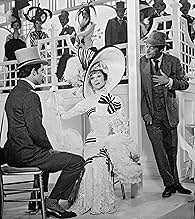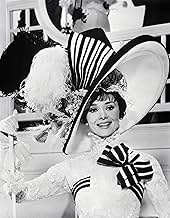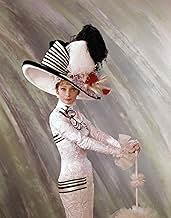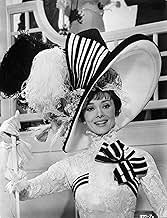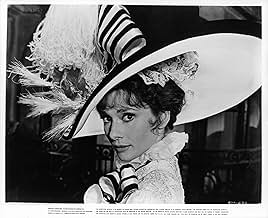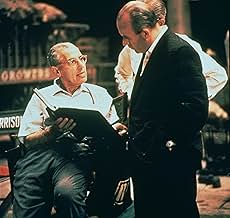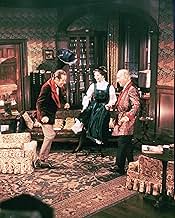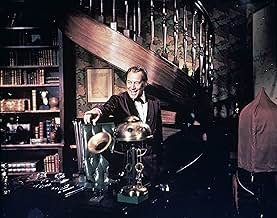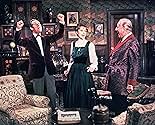En el Londres de 1910, el esnob profesor de fonética Henry Higgins acepta la apuesta de que puede hacer que la vulgar florista Eliza Doolittle esté presentable en la alta sociedad.En el Londres de 1910, el esnob profesor de fonética Henry Higgins acepta la apuesta de que puede hacer que la vulgar florista Eliza Doolittle esté presentable en la alta sociedad.En el Londres de 1910, el esnob profesor de fonética Henry Higgins acepta la apuesta de que puede hacer que la vulgar florista Eliza Doolittle esté presentable en la alta sociedad.
- Ganó 8 premios Óscar
- 26 premios y 13 nominaciones en total
Elizabeth Aimers
- Cockney
- (sin acreditar)
Helen Albrecht
- Ascot Extra
- (sin acreditar)
John Alderson
- Jamie - Doolittle's crony
- (sin acreditar)
Mary Alexander
- Cockney
- (sin acreditar)
Gertrude Astor
- Cockney
- (sin acreditar)
LaWana Backer
- Ad Lib at Church
- (sin acreditar)
Walter Bacon
- Ball Guest
- (sin acreditar)
Best Picture Winners by Year
Best Picture Winners by Year
See the complete list of Best Picture winners. For fun, use the "sort order" function to rank by IMDb rating and other criteria.
Argumento
¿Sabías que...?
- CuriosidadesCostume designer Cecil Beaton created 1,500 costumes for this movie, with the exception of the pearl white gown Hepburn wears to the Embassy Ball, an original Edwardian specimen Beaton found in an antique shop.
- PifiasWhen Prof. Higgins sings "An Ordinary Man" he turns on several phonographs, seconds later he turns off one of them but all of the sounds stop.
- Citas
Eliza Doolittle: The difference between a lady and a flower girl is not how she behaves, but how she is treated.
- Créditos adicionalesIn the posters, playbills and the original cast album for the stage version of "My Fair Lady", the credits always read "based on Bernard Shaw's 'Pygmalion' ", letting the audience know what play "My Fair Lady" was actually adapted from. The movie credits simply read "from a play by Bernard Shaw".
- Versiones alternativasIn the remastered version of the film, some of the scene changes are changed from sudden cuts to wipe outs, as they probably were when the film was released. When CBS Fox released it on video originally, they were changed to sudden cuts.
- ConexionesFeatured in Toast of the Town: Episodio #18.17 (1965)
- Banda sonoraWhy Can't the English?
(1956) (uncredited)
Music by Frederick Loewe
Lyrics by Alan Jay Lerner
Performed by Rex Harrison, Wilfrid Hyde-White, and Audrey Hepburn
Reseña destacada
There's a lot of negative things been said about Audrey Hepburn's interpretation of the role of Eliza. Perhaps she's not ideal in the earliest scenes of the movie - her "dirtiness" is never quite believable - but it has to be said that despite this smallish drawback she still glows, and makes an amazing Eliza overall.
The reason for this is simple; Audrey Hepburn brings her "own spark of divine fire", (to quote Higgins) to the role and her vulnerability, mixed with her sweet, naive charm and even her wonderfully juvenile pettishness shown in "Just You Wait" all prove what a talented actress she really is. For an example of this, just watch Eliza's facial expression at Ascot, when she realises her opportunity to demonstrate her new-found mastery of the English tongue - sweetly hilarious.
MFL has been criticized as being too romanticized, too overblown. I disagree; musicals are suposed to be lavish affairs, and none pull it off quite so well as "My Fair Lady" does. It's a momentous film but it has its subtle points: watch the way in which Eliza's eyes are centred on Higgins when she enters at the ball, and the way in which the two of them stare at each other for a few seconds at the top of the stairs a few moments later.
It musn't be overlooked that, thanks to its being based on a Bernard Shaw play, "My Fair Lady" has what the great majority of musicals lack: a deeper meaning and something really quite profound to say.
The actor in the role of Colonel Pickering is a little weak, but it must be said that Rex Harrison IS Henry Higgins. In a lot of ways (in fact, in most ways) Higgins has an objectionable personality: rude, snobbish, impatient and even misogynistic, but somehow Rex Harrison pulls it all off and makes us like Higgins without betraying the character. As to romance, his song "I've Grown Accustomed to Her Face" is an ode to the kind of love which sneaks up on you. Overall, this movie is romantic, but not too sentimental. It has just enough romance to be dramatically fulfilling, but it never becomes soppy or mawkish. The word "love" is never mentioned at all and the two leads never even kiss. The famous end sequence is perfect and does the movie justice; after all, a big happy bow tied around a perfect romance at the end would simply not fit with everything we have learned about the two protagonists.
The reason for this is simple; Audrey Hepburn brings her "own spark of divine fire", (to quote Higgins) to the role and her vulnerability, mixed with her sweet, naive charm and even her wonderfully juvenile pettishness shown in "Just You Wait" all prove what a talented actress she really is. For an example of this, just watch Eliza's facial expression at Ascot, when she realises her opportunity to demonstrate her new-found mastery of the English tongue - sweetly hilarious.
MFL has been criticized as being too romanticized, too overblown. I disagree; musicals are suposed to be lavish affairs, and none pull it off quite so well as "My Fair Lady" does. It's a momentous film but it has its subtle points: watch the way in which Eliza's eyes are centred on Higgins when she enters at the ball, and the way in which the two of them stare at each other for a few seconds at the top of the stairs a few moments later.
It musn't be overlooked that, thanks to its being based on a Bernard Shaw play, "My Fair Lady" has what the great majority of musicals lack: a deeper meaning and something really quite profound to say.
The actor in the role of Colonel Pickering is a little weak, but it must be said that Rex Harrison IS Henry Higgins. In a lot of ways (in fact, in most ways) Higgins has an objectionable personality: rude, snobbish, impatient and even misogynistic, but somehow Rex Harrison pulls it all off and makes us like Higgins without betraying the character. As to romance, his song "I've Grown Accustomed to Her Face" is an ode to the kind of love which sneaks up on you. Overall, this movie is romantic, but not too sentimental. It has just enough romance to be dramatically fulfilling, but it never becomes soppy or mawkish. The word "love" is never mentioned at all and the two leads never even kiss. The famous end sequence is perfect and does the movie justice; after all, a big happy bow tied around a perfect romance at the end would simply not fit with everything we have learned about the two protagonists.
- eliza-doolittle
- 27 ago 2003
- Enlace permanente
Selecciones populares
Inicia sesión para calificar y añadir a tu lista para recibir recomendaciones personalizadas
Detalles
- Fecha de lanzamiento
- País de origen
- Sitio oficial
- Idioma
- Títulos en diferentes países
- Mi bella dama
- Localizaciones del rodaje
- Empresa productora
- Ver más compañías en los créditos en IMDbPro
Taquilla
- Presupuesto
- 17.000.000 US$ (estimación)
- Recaudación en Estados Unidos y Canadá
- 72.560.711 US$
- Fin de semana de estreno en EE. UU. y Canadá
- 354.764 US$
- 17 feb 2019
- Recaudación en todo el mundo
- 72.684.726 US$
- Duración2 horas 50 minutos
- Color
- Mezcla de sonido
- Relación de aspecto
- 2.20 : 1
Contribuir a esta página
Sugerir un cambio o añadir el contenido que falta

Principal laguna de datos
By what name was My Fair Lady (Mi bella dama) (1964) officially released in India in Hindi?
Responde






